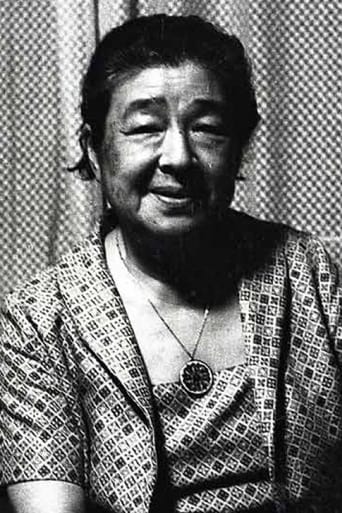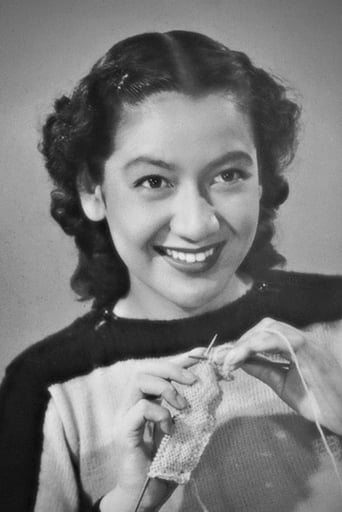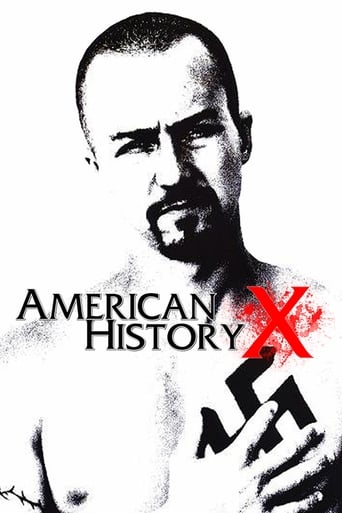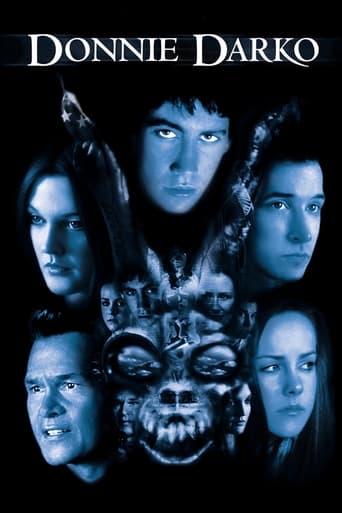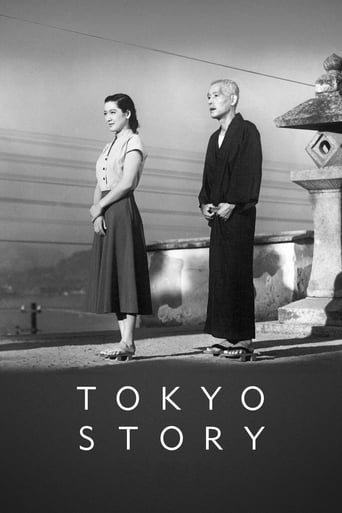
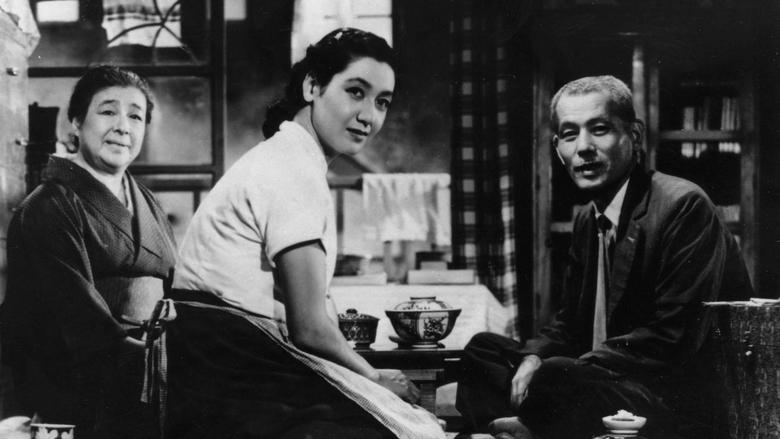
Tokyo Story (1953)
The elderly Shukishi and his wife, Tomi, take the long journey from their small seaside village to visit their adult children in Tokyo. Their elder son, Koichi, a doctor, and their daughter, Shige, a hairdresser, don't have much time to spend with their aged parents, and so it falls to Noriko, the widow of their younger son who was killed in the war, to keep her in-laws company.
Watch Trailer
Cast


Similar titles
Reviews
My title may sound like an oxymoron, yet I can think of no more fitting way to describe Tokyo Story. The weighted themes on death and the separation of children from parents, and the clearly fractured relationships between characters, are ripe for the screens of your next soap opera; yet it is handled so delicately, so subtly, that for a large portion many may complain there isn't drama enough.Parents take a long train journey to visit their adult children in Tokyo. Their children are for the most part polite and accommodating, yet so busy with employment they are unable to spend any quality time together, and privately view their parents presence as a burden. The pace is unhurried, and to the detriment of entertainment, conversations are carried out with a realistic mundane-ness. As the selfishness behind the facade of mannered conversation is slowly revealed, this approach becomes a powerful tool to reflect on the sadder aspects of family relations. And where typical melodramas may rush to have characters verbalise their upset, and make a mockery of it in the process, Tokyo Story manages to reveal that upset in a manner largely unspoken, and far more evocative because of it. With the films title, and many location cutaways, the younger generations busyness and neglect of their elders in a large city may also be seen as a metaphor for modern life's alienation and neglect of values. They do not mean harm, but Tokyo Story shows its heart by being a melancholy display on what is lost.All things considered, Tokyo Story is an ode to cherish human relationships, and a critique on human frailty and modern life. It is a sad and touching film, but meanders very slowly, particularly at the beginning.
An elderly couple leaves their hometown Onomichi for Tokyo. They visit their children, but children are busy and cannot spare time for the parents. Ironially, only the wife of their second son who was killed in the Second World War is concerned about them.This film shows a simple ordinary life realistically. It made me think about family bonds and parent-child relationship again.Although there is no showy scenes and special event in this film, I don't know why but, I was fascinated by this story.This film was made 64 years ago, but I was able to accept it easily. Also this film is rated very highly not only in Japan but also in the world.I think the reason "Tokyo Monogatari" is liked by a lot of people across the border and generation is that it describes human nature thoroughly.Setsuko Hara's acting is very good and she is a person with presence.I want to watch other films directed by Yasujiro Ozu.
When I was young, my reaction to film "classics" that I didn't like was that other people were simply wrong, but since that time I have come to understand that movies speak to people in very different ways. This movie is one I cannot connect with.In Tokyo Story, an elderly couple come to Tokyo to visit their children, who are too busy to spend much time with them. This dynamic plays out at a glacial pace. About a third of the way through the movie I came to believe it would be entirely plot less, and while it's not quite that, it is definitely got a lot more "Tokyo" in it than "Story."While the old people are very genial and pleasant, I didn't find their "story" that interesting. The movie did become more engrossing and affecting in its final third, but not enough to make up for the tedium of the first two thirds.The main reason I watched this movie was to see the brilliant Setsuko Hara, whose mesmerizing performance in Late Spring (also directed by Ozu) was most of the reason to watch it. She's very good here, but she's also got a pretty small part, which was very disappointing to me.Having seen two Ozu "classics" I'm thinking he's one of these highly admired film directors, like Godard or Jarmusch, whose appeal I find puzzling.Tokyo Story has been ranked by some as the greatest film ever made, but in a world of films like Rashomon, The Third Man, Citizen Kane, and Spirited Away, it's a label I cannot understand being placed on this particular movie.
I have always considered myself a film buff but I just didn't get Tokyo Story. I've enjoyed silent films and "art" films, but this 2+ hour long examination of an elderly couple visiting the big city of Tokyo to visit many of their children and in-laws was painful to watch. I clicked on the "spoiler alert" box but there is really nothing that can be spoiled: the plot is so "everyday life of ordinary people" that there is no suspense at any point in the movie. The parents are very simple people and speak simply, often only affirming or negating a question by saying "yes," "no," or "is that right?" So there is nothing resembling sterling dialogue. No, it is a character study of relationships among the family that carries on interminably.What was odd to me was how unconcerned their children were about the visit and how little they were willing to sacrifice in time for their parents even as the trip must have been long-prepared. Perhaps the cognitive dissonance of my associating Asian cultures with respecting the elderly (if not their parents!) was surprising to me. Most people would have treated elderly strangers with more consideration. Their indifference was almost painful to watch. It was almost as if the director wanted to make the children as selfish and negligent as possible and exaggerated their flaws.The cinematography was excellent but it, too, seemed odd as if beautiful scenic shots were interspersed among the tight interior shots where the sparse dialogue was taking place. It did break up the monotony of the first-grade level vocabulary and dialogue.Give me the weakest Kurosawa any day over this. And Roger Ebert gave it 4 stars (highest rating) and said it was one of the greatest movies EVER made. I'm giving it 6 stars because I must be missing something obvious.



